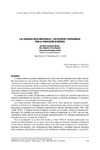Identificador persistente para citar o vincular este elemento:
https://accedacris.ulpgc.es/jspui/handle/10553/58472
| Título: | Las variables socio emocionales y los intereses profesionales para la orientación académica | Autores/as: | Rodríguez Mateo, Heriberto Javier Pazos Nogales, Aida Alejandra Rodríguez Trueba, José Carlos |
Clasificación UNESCO: | 58 Pedagogía | Palabras clave: | Orientación académica y profesional Proceso de toma de decisiones Intereses profesionales Moldes mentales Educación Secundaria Obligatoria, et al. |
Fecha de publicación: | 2017 | Publicación seriada: | INFAD | Resumen: | El interés profesional puede entenderse como la inclinación del individuo hacia ciertas actividades relacionadas con una profesión. Fogliatto, Pérez, Olaz y Parodi (2003) definen el interés profesional como los patrones de gustos, indiferencias y aversiones respecto a actividades relacionadas con carreras y ocupaciones, siendo su valoración importante porque permite prever el total de satisfacción que una persona experimentará en el desempeño de un oficio. El interés profesional es relevante para el proceso de orientación profesional porque actúa como reforzante en la conducta vocacional del individuo (Lobato, 2002).
Es evidente que la toma de decisiones académicas se ve influida por variables tales como los intereses profesionales del individuo y su forma de pensar a la hora de enfrentarse a la realidad y ver el mundo y la vida (variables socio emocionales).
Los moldes mentales (Hernández-Guanir, 2002, 2010), como ejemplo de variables socioemocionales, se definen como estrategias habituales y peculiares que cada persona muestra en el modo de encauzar, de reaccionar o de interpretar situaciones de la realidad (Hernández-Guanir, 1991, 1997 y 2002, 2010). El objetivo de esta investigación es doble: por una parte, analizar los intereses profesionales y las variables socio-afectivas de una muestra de estudiantes de la ESO, y de otro lado, comprobar si existe relación entre las variables socioemocionales y los intereses profesionales del alumnado de cara a la orientación académica.
Para la investigación se aplicó el test moldes y el test CIPSA de intereses profesionales una muestra de 200 estudiantes de los cuatro cursos de la etapa de Educación Secundaria Obligatoria de tres centros diferentes. Los resultados indican, entre otras cosas, cuáles son los intereses profesionales más elegidos y más rechazados por estos estudiantes, y se pueden observar relaciones entre encuadres, dimensiones y moldes con los factores de intereses profesionales, lo que confirma la hipótesis inicial de interacción entre la forma de ver el mundo y la vida y los intereses profesionales de los estudiantes.
Los moldes de hiperanálisis, atribución estrategias y de disociación emocional pueden predecir, a través de un modelo de regresión lineal múltiple, el número de elecciones realizadas por el alumnado. Professional interest can be understood as the inclination of the individual towards certain activities related to a profession. Fogliatto, Pérez, Olaz and Parodi (2003) define the professional interest as the patterns of tastes, indifference and aversions with respect to activities related to careers and occupations, being their valuation important because it allows to predict the total satisfaction that a person will experience in the performance Of an office. Professional interest is relevant to the professional orientation process because it acts as a reinforcer in the individual’s vocational behavior (Lobato, 2002). It is clear that academic decision-making is influenced by variables such as the professional interests of the individual and their way of thinking when facing reality and seeing the world and life (socio-emotional variables). The mental models (Hernández-Guanir, 2002, 2010), as an example of socio-emotional variables, are defined as habitual and peculiar strategies that each person shows in the way of channeling, reacting or interpreting situations of reality (Hernández-Guanir, 1991, 1997 and 2002, 2010). The objective of this research is twofold: on the one hand, to analyze the professional interests and socio-affective variables of a sample of ESO students, and on the other hand, to check if there is a relationship between the socio-emotional variables and the professional interests of the students Facing the academic orientation. For the investigation the test molds and the CIPSA test of professional interests were applied a sample of 200 students of the four courses of the stage of Compulsory Secondary Education of three different centers. The results indicate, among other things, which are the most chosen professional interests and most rejected by these students, and it is possible to observe relations between frames, dimensions and molds with professional interest factors, which confirms the initial hypothesis of interaction between Way of seeing the world and the life and professional interests of students. The models of hyper-analysis, attribution strategies and emotional dissociation can predict, through a multiple linear regression model, the number of choices made by students. |
URI: | https://accedacris.ulpgc.es/handle/10553/58472 | ISSN: | 0214-9877 | Fuente: | International Journal of Developmental and Educational Psychology: INFAD. Revista de Psicología [ISSN 0214-9877], v. 1 (2), p. 315-328 | URL: | http://dialnet.unirioja.es/servlet/articulo?codigo=6295754 |
| Colección: | Artículos |
Visitas
114
actualizado el 31-ago-2024
Descargas
114
actualizado el 31-ago-2024
Google ScholarTM
Verifica
Comparte
Exporta metadatos
Los elementos en ULPGC accedaCRIS están protegidos por derechos de autor con todos los derechos reservados, a menos que se indique lo contrario.
